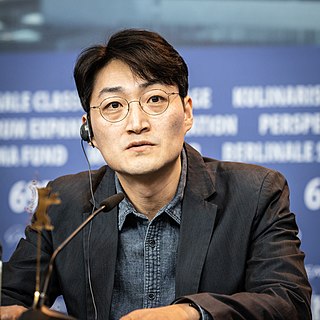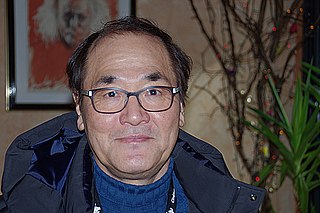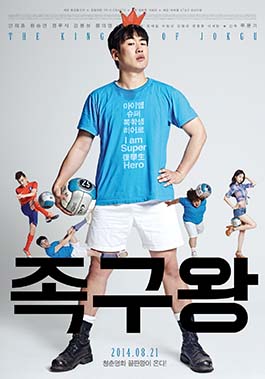Related Research Articles

R-Point is a 2004 South Korean psychological horror war film written and directed by Kong Su-chang. Set in Vietnam in 1972, during the Vietnam War, it stars Kam Woo-sung and Son Byong-ho as members of the South Korean Army in Vietnam. Most of the movie was shot in Cambodia. Bokor Hill Station plays a prominent part of the movie, in this case doubling as a French colonial plantation. In 2011, Palisades Tartan re-released this film on DVD under the title Ghosts of War.

Jang Jin is a South Korean film director, theatre director, playwright, screenwriter, film producer, actor and TV personality.

Lee Kyoung-mi is a South Korean film director and screenwriter.
Shin Su-won is a South Korean film director and screenwriter. Shin wrote and directed Passerby #3 (2010), Pluto (2013) and Madonna (2015). Her short film Circle Line won the Canal+ Prize for Best Short Film at the 2012 Cannes Film Festival.
Yoon Jong-chan is a South Korean film director. He directed Sorum (2001), Blue Swallow (2005), I Am Happy (2009) and My Paparotti (2013).
Park Chan-ok is a South Korean film director and screenwriter. She wrote and directed Jealousy Is My Middle Name (2003) and Paju (2009).
Zhang Lü is a Chinese filmmaker. Zhang was originally a novelist before embarking on a career in cinema. His arthouse films have mostly focused on the disenfranchised, particularly ethnic Koreans living in China; these include Grain in Ear (2006), Desert Dream (2007), Dooman River (2011), Scenery (2013), and Gyeongju (2014).
Cho Chang-ho is a South Korean film director and screenwriter. Cho wrote and directed The Peter Pan Formula (2006) and Lovers Vanished (2010).

Lee Su-jin is a South Korean film director and screenwriter. His first feature was the award-winning Han Gong-ju (2014).

Bae Chang-ho is a South Korean director and screenwriter.
Yoon Sung-hyun is a South Korean film director and screenwriter. Yoon's directorial debut, a graduation project, Bleak Night received rave reviews and won several Best New Director awards at the 48th Grand Bell Awards, 32nd Blue Dragon Film Awards and 12th Busan Film Critics Awards.
Park Jung-bum is a South Korean film director, screenwriter and actor. Park wrote, directed, and acted in his directorial debut The Journals of Musan (2011), which won the New Currents Award and FIPRESCI Award at the 15th Busan International Film Festival, Golden Star at the 10th Marrakech International Film Festival, Tiger Award at the 39th International Film Festival Rotterdam, Grand Prize and Young Critics Award at the 47th Pesaro International Film Festival, Jury Prize at the 13th Deauville Asian Film Festival, and more - a total of 17 awards were won at major film festivals around the world since it premiered at the Busan International Film Festival in 2010.

Yoon Hong-seung, who also goes by the pseudonym Chang, is a South Korean film director and screenwriter. A former music video director, Chang debuted with the Korean horror film Death Bell in 2008. His second feature The Target (2014) - a remake of the 2010 French film Point Blank, won the Golden Goblet Award at the Shanghai International Film Festival, and was also invited to the Cannes Film Festival and Busan International Film Festival in 2014.
Kim Dong-won is a South Korean documentary filmmaker. Kim is best known for his documentary films Repatriation (2004) and 63 Years On (2008).

Shim Sung-bo is a South Korean film director and screenwriter.
Lee Jung-gook is a South Korean film director and screenwriter. Lee's feature debut Song of Resurrection (1990) was banned as its plot deals with the 1980 Gwangju Uprising. He won critical acclaim for his second feature The Story of Two Women (1994) by winning numerous awards at the 32nd Grand Bell Awards, including Best Film, Best New Director and Best New Actress, and Best New Director at the 14th Korean Association of Film Critics Awards in 1994. A Thai version of The Letter was made in 2004, with the same title.
Chang-Wha Chung is a South Korean film director, producer and screenwriter. Chung made his directorial debut with The Final Temptation (1953) and gained attention only when he released A Sunny Field in 1960. During the 1960s he started collaborating with the Hong Kong film industry. In 1968, he joined Shaw Brothers and directed martial arts classics such as King Boxer (1972). He moved to Golden Harvest in 1973, where he directed numerous productions until he returned to South Korea in 1977 to continue his career.

The King of Jokgu is a 2013 South Korean independent sports comedy film about Jokgu, a Korean cross between football and volleyball. A directorial feature debut by Woo Moon-gi, the film was a surprise hit, attracting over 40,000 viewers, unheard of for an indie comedy in Korea and was one of the most well-received indie films from 2014. It made its world premiere at the 18th Busan International Film Festival in 2013.
Woo Moon-gi, is a South Korean film director. Woo's directorial feature debut, the indie sports comedy The King of Jokgu (2013), has won various awards, including Best New Director and Special Jury Prize at the 20th Chunsa Film Art Awards, and Best Independent Film Director at the 15th Director's Cut Awards.
No Zin-soo is a South Korean film director and screenwriter.
References
- 1 2 "KONG Su-chang". Korean Film Biz Zone. Retrieved 2016-05-28.
- 1 2 "9th Busan International Film Festival (2004)". Busan International Film Festival . 2004. Retrieved 2016-05-28.
- ↑ Kim, Hyun-jung (17 May 2016). "R-Point". Korean Film Biz Zone. Retrieved 2016-05-28.
- ↑ Yang, Sung-jin (19 August 2004). "R-Point puts fresh spin on the horrors of war". The Korea Herald via Hancinema . Retrieved 2016-05-28.
- ↑ Yi, Ch'ang-ho (4 April 2008). "R-point's KONG Su-chang returns with The Guard Post". Korean Film Biz Zone. Retrieved 2016-05-28.
- ↑ "Horror Film Series to Hit Television". The Korea Times via Hancinema . 13 July 2006. Retrieved 2016-05-28.